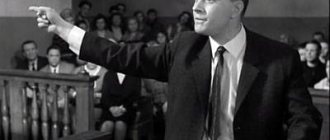Aphorisms of the Spartans
Agesilaus II (c. 422 - c. 353 BC) king of Sparta, commander and diplomat
It is difficult to be both merciful and reasonable. [1060] The inhabitants of Asia Minor are worthless free citizens, but as slaves they are excellent. [1061] Courage has no value unless justice is combined with it; but if everyone were just, there would be no need for courage. [1062] Having received the necessary oracle from Zeus at Olympia, he [Agesilaus], by order of the ephors, had to turn to the Pythian oracle with the same question; and he sent to Delphi to ask: “Does Phoebus [i.e. e. Apollo] the words of his father?” [1063] If Agesilaus heard someone being praised or blamed, he believed that it was no less important to know the character of those who spoke than those who were judged. [1064] When a certain doctor prescribed him [Agesilaus] a carefully designed course of treatment, which was very difficult to carry out, the king exclaimed: “By the gods, it is not said anywhere that I absolutely need to live and go to any lengths for this.” [1065] Agesilaus especially loved children: at home, playing horses with the little ones, he rode on a stick. When one of his friends caught him doing this, the king asked him not to tell anyone about it until he himself became a father. [1066] At the Battle of Leuctra, many Spartans fled from the battlefield and, according to the law, were subject to deprivation of civil honor (atymia) for this. However, the ephors, seeing that the city would thus lose its men at a time of extreme need for warriors, did not know how to avoid atymia and at the same time comply with the laws. Then Agesilaus was elected legislator. Arriving at the People's Assembly Square, he said: “I would not agree to become a legislator in order to introduce new laws; and I will not make any cuts or changes to the current ones. Our present laws are good and must be maintained in full force... starting tomorrow.” [1067]
Agid II (5th century BC) son of Archidamus, king of Sparta in 427-402. BC.
The Lacedaemonians ask about their enemies not how many there are, but where they are. [1068] Agid, hearing the praise of the Eleans for the excellent and fair organization of the Olympic Games, remarked: “It is indeed a great thing to observe justice once every four years.” [1069] One old man complained to Agis, who had already reached old age, that the old laws had fallen into oblivion, and the new ones were bad, and that everything in Sparta had turned upside down. The king laughed and said: “If so, then everything goes as usual. As a child, I heard from my father that in his time everything was turned upside down.” [1070]
Antalcides (? - c. 370 BC) Spartan naval commander and diplomat
When one sophist wanted to praise Hercules, Antalcides asked: “Does anyone blame him?” [1071]
Archidamus III (400-338 BC) son of Agesilaus II, king of Sparta
He who knows how to speak knows the time to do so. [1072] Archidamus in the Peloponnesian War, when the allies demanded to determine their exact contributions, replied: “There are no rations for war.” [1073] When someone asked Archidamus, son of Zeuxidamus, who was at the head of Sparta, he answered: “Laws and authorities acting by law.” [1074] After the battle of Chaeronea, Philip [of Macedon] addressed Archidamus, the son of Agesilaus, with a letter written very arrogantly. He replied: “If you, king, measure your shadow, you will find that it has not become larger than it was before the victory.” [1075] During the war with Philip, some thought it more advantageous to engage in battle further from home. “You shouldn’t think about this,” said Archidamus, “but about being stronger than the enemy where you have to fight.” [1076]
Eudamides son of Archidamus, Spartan
Seeing Xenocrates, already an elderly man, at the Academy, discussing philosophical issues with his acquaintances, Eudamides, the son of Archidamus and brother of Agis, asked who this old man was. He was told that this was one of those sages who were busy searching for virtue. “When,” asked Eudamid, “will he use it, if now he is only looking for it.” [1077]
Eurycrates Anaxander Spartan
When someone asked Eurycrates Anaxander why the Spartans did not keep money in the public treasury, he replied: “So as not to seduce those who would guard it.” [1078]
Clearchus
(? – 401 BC) Spartan commander, chief of Greek mercenaries in the army of Cyrus the Younger
A soldier should fear his superior more than his enemies. [1079]
Leonidas I
(c. 507 - 480 BC) Spartan king, died at the Battle of Thermopylae
When someone told Leonid that he was leading too few people into battle, he replied: “Too many - because they are doomed to death.” [1080] When his wife asked him [Leonid] during their departure if he would say something to her in parting, he said, turning around: “I wish you a good husband and good children.” [1081] When during the battle [at Thermopylae] someone exclaimed: “Because of the barbarian arrows the sun is not visible,” Leonidas said: “Okay, we will fight in the shadows.” [1082] [One of the Spartans] said: “The barbarians are already near.” Leonidas replied: “So we are close to them.” [1083] [Leonidas] ordered his soldiers to have breakfast, announcing that they would have lunch in Hades. [1084]
Lycurgus of Lacedaemon
(IX – VIII centuries BC) legendary Spartan legislator
Lycurgus of Lacedaemon advised his fellow citizens to take care of their hairstyles: a hairstyle makes the beautiful even more beautiful, and the ugly are even more terrible to their enemies. [1085] To the man who proposed to establish democracy in the city, he [Lycurgus of Lacedaemon] said: “First establish democracy in your house.” [1086]
Lysander (? – 395 BC) Spartan commander
When they told him [Lysander] that it was not proper for the descendants of Hercules to achieve victories through cunning, he responded to these reproaches with a contemptuous laugh. “Where the lion’s skin is short, it needs to be hemmed with fox skin,” he said. [1087] Lysander (...) advised (...) to deceive adults with oaths, like children with dice. [1088] Lysander the Lacedaemonian reprimanded (...) a soldier who had gone astray [during the campaign]. When he said that he left the detachment without the goal of stealing anything, Lysander replied: “I want you not to even look like someone trying to steal.” [1089]
Pausanias (c. 510 - c. 470 BC) Spartan commander
One doctor said to Pausanias: “You have become old.” “Because,” the king answered, “I was not treated by you.” [1090]
Pedarite (Pedaret) Spartan military leader, participant in the Peloponnesian War
Pedarit, not chosen among the three hundred [best warriors], left, beaming and rejoicing that there were three hundred better people in the city than him. [1091]
Plistarchus (5th century BC) son of Leonidas, king of Sparta in 480-459. BC.
Plistarch was told that a very ill-tongued person spoke well of him. “Didn’t anyone tell him,” Plistarchus was surprised, “that I died?” [1092]
Polystratid Spartan
Polystratidas and his comrades arrived as an embassy to the generals of the Persian king; they inquired whether they had come on a private matter or on behalf of the state. “If everything goes well - on behalf of the state, if not - on a private matter,” answered Polistratid. [1093]
Fearid the Megalopolitan
One day Fearid was sharpening his sword. He was asked if he was sharp enough. “Sharper than slander,” he replied. [1094]
Theopompus the Spartan
Theopompus was the first of those who reigned in Sparta to share power with the five ephors. When his wife scolded him afterwards, reproaching him that he would transfer less power to his children than he had inherited himself, he objected: “Yes, less, but just as much stronger!” [1095]
Charillus the Spartan
Someone asked Charillus why the Spartans bring out women in capes and girls without. “Girls,” said Kharill, “should look for husbands, and women should stick to those they have.” [1096]
Unknown Spartans Once, when the Samian ambassadors spoke for too long, the Spartans told them: “We forgot the first part of your speech, and did not understand the next part, since we forgot the first.” [1097] Once, during the stay of several Chians in Sparta, they, having dined in the hall of the ephors, left traces of vomit on the floor and even relieved themselves on the chairs on which they were sitting. The Spartans conducted a thorough investigation to see if any of their fellow citizens had done this, but when it turned out that they were Chians, they announced through a herald: “Chians are allowed to shit.” [1098] Some young man did not give up (...) his place [to the famous commander Derkellid] and said: “You have not given birth to a son who would have given up his place to me in due time.” [1099] [The Spartan], whom the funeral director placed in the choir at the very edge, (...) said: “Well done for coming up with the idea of how to make this place an honor!” [1100] The Spartan woman, handing the shield to her son, inspired him: “Either with him, my son, or on him.” [1101] The mother said to her son, who was accused of a crime: “My son, destroy either the accusation or yourself.” [1102] When the sons of one Spartan woman, having fled from the battlefield, came to her, she said: “Cowardly slaves! Where are you running? Maybe you want to hide here, where you were born from?” And with these words she lifted her dress. [1103]









